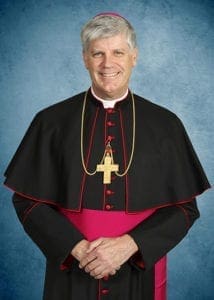A bridge to the unborn
By BISHOP BERNARD E. SHLESINGER III, Commentary | Published October 29, 2020 | En Español
Pope Francis is a man dedicated to dialogue and building bridges between people no matter the issue. His consistent reference to building bridges rather than walls resonates with me as a pastoral style that is needed today.

Bishop Bernard E. Shlesinger III
The church cannot live behind the walls of a chancery; she must listen, converse as well as preach. Bishops should not limit themselves to proclaiming doctrine, they must dine with those who feel alienated from the church and be open to their criticism.
Pope Francis, the “Pontifex Maximus” (meaning the Great Bridge Builder) once said in reference to those who prefer to build walls that “they will end up imprisoned by the walls they have built.” I am not writing against homeland security, for defending one’s homeland is important.
Today, millions of dollars are spent on cybersecurity in order to keep out the bad guys who are after valuable information. The image of a castle with fortified walls evokes a feeling of strength, capable of repelling unwanted threats and appears intimidating to those who live outside of its protection. In addition, the castle with its walls can also reflect an exclusive community of people who live in constant fear.
Bridges bring people together on the path of peace and the draw bridge allows people to come and go freely. Jesus is the bridge between heaven and earth—the one Mediator between God and man (1 Tm 2:5). He does not build walls but challenges us to tear some down in order to build bridges, for example economic walls that affect developing nations and do not promote basic human dignity. The story of Lazarus who begged at the gate of a rich man challenges us to go beyond a life of luxury in order to live a life of charity (Lk 16:19-31).
Let us consider the image of a bridge in reference to the unborn. These children of God are denied rights and dignity as created beings in the image and likeness of God (Gn 1:26). Behind the wall of personal privacy, as interpreted by the Supreme Court, is a matter of the unborn voiceless person who is created for life. If we do not build a bridge to the unborn, we fail to advocate for human dignity and imprison ourselves in a misguided sense of freedom.
There is a need to speak for the child whose heart beats and to engage in a dialogue with the men and women who live in fear of the future. An organization that is building bridges to the unborn and teaches the importance of motherhood and fatherhood is the Pregnancy Aid Clinic of Atlanta. The offering of an ultrasound, free pregnancy testing and education are effective ways of bridge building in saving lives. We must also support such efforts in order to become a voice for the voiceless who are forever in danger.
The Lord hears the cry of the poor (Ps 34). Do we hear the cry of the voiceless, defenseless children of God? Our silence concerning the unborn leads to the acceptance of those who are unwanted to be cast aside—the most vulnerable and defenseless.
The illusion that liberty is an autonomous choice is one wall that needs to come down. At the heart of the church is charity, not the license to do as one pleases without interference. Charity knows no walls and is the bridge to a culture of life and authentic freedom.